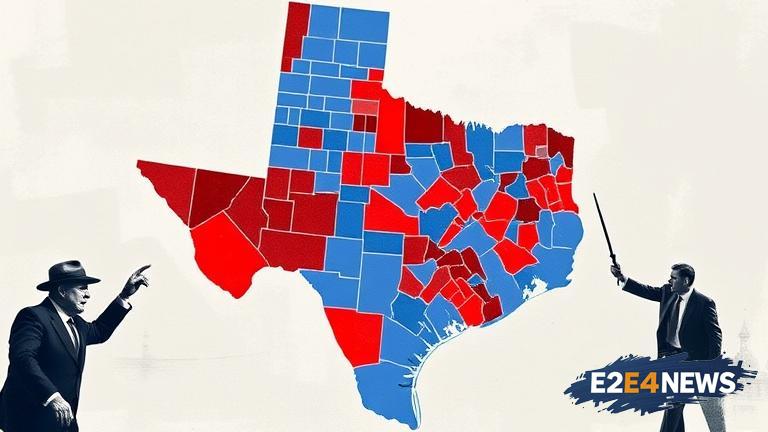The Texas redistricting process has been marred by controversy, with Democrats staging a quorum break to protest the proposed plans. The quorum break, which began on July 12, has brought the legislative process to a standstill, with Democrats refusing to return to the state Capitol until their concerns are addressed. The redistricting plans, which were proposed by Republican lawmakers, have been criticized for being heavily gerrymandered, with many arguing that they unfairly favor the GOP. Democrats argue that the plans are designed to limit the voting power of minority communities and silence the voices of marginalized groups. The quorum break has been seen as a last-ditch effort by Democrats to block the passage of the redistricting plans, which they claim are unconstitutional. The move has been met with criticism from Republicans, who accuse Democrats of abandoning their duties and neglecting their responsibilities to their constituents. Despite the criticism, Democrats remain resolute, arguing that they are fighting for the rights of their constituents and the integrity of the democratic process. The redistricting plans have been the subject of intense debate, with many arguing that they are a prime example of partisan gerrymandering. The plans have been criticized for splitting communities of interest, packing minority voters into a few districts, and creating safe seats for Republican lawmakers. The quorum break has also highlighted the deep divisions within the Texas Legislature, with many lawmakers on both sides of the aisle refusing to budge. The standoff has sparked a national debate about the role of gerrymandering in American politics, with many arguing that it is a major contributor to the polarization and gridlock that plagues Washington. The Texas redistricting process has also been the subject of several lawsuits, with many arguing that the plans violate the Voting Rights Act and the Constitution. The lawsuits have been filed by a range of groups, including the NAACP, the League of United Latin American Citizens, and the Texas Civil Rights Project. The quorum break has also sparked a wave of protests and rallies, with many Texans taking to the streets to express their opposition to the redistricting plans. The protests have been organized by a range of groups, including the Texas Democratic Party, the ACLU, and the NAACP. Despite the protests and lawsuits, it remains unclear whether the quorum break will be successful in blocking the passage of the redistricting plans. The outcome of the standoff is likely to have major implications for the future of Texas politics, with many arguing that it could determine the balance of power in the state for years to come. The redistricting process has also highlighted the importance of civic engagement and participation, with many arguing that it is essential for Texans to make their voices heard and demand fair representation. The quorum break has also sparked a national conversation about the role of state legislatures in shaping the democratic process, with many arguing that they are increasingly becoming battlegrounds for partisan warfare. The Texas redistricting process has also been the subject of intense media scrutiny, with many outlets providing in-depth coverage of the controversy. The coverage has helped to raise awareness about the issue, with many Texans becoming more engaged and informed about the redistricting process. Overall, the Texas redistricting showdown is a complex and multifaceted issue, with many different stakeholders and interests at play. As the standoff continues, it remains to be seen whether the quorum break will be successful in blocking the passage of the redistricting plans, or whether the plans will ultimately be enacted into law.
